|
PART 2
|
|
|
|
|
|
As stated in "Part 1 of 3", Ebanezer (Eban) Townsend Starr of Yonkers,
New York patented and manufactured 3 types of percussion revolvers
that were purchased by the United States Government starting in
1861 and ending in 1864. 6,352 Starr DA Navy and Army revolvers
were purchased on the open market and 41,102, including the SA Army,
were purchased under contract for a total of 47,454 guns. The Starr
DA Army accounted for approximately 23,000 of the total. It is believed
that both the DA and SA Starr Army revolvers shared the same serial
number range with the numbering for the SA's starting off where
the numbering for the DA Army stopped. The DA Navy had it's own
serial number range. Starr revolvers were the third highest in number
to be purchased by the Union government. All three of these models
are pictured below:
|
|
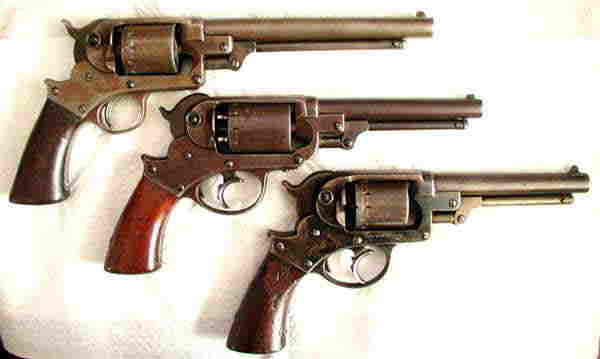
From Top To Bottom Starr
Model 1863 Single Action .44 Caliber Percussion Army Revolver
(1863-1864
|
|
|
|
|
|
The Model 1858 Double Action .44 caliber Percussion Army Revolver
was the second of the Starrs produced. The Starr Arms Company of
New York City, Yonkers, Binghamton and Moorisania, New York delivered
16,100 Model 1858 Army revolvers to the government at a price of
$25.00 each between January, 1862 and May, 1863. This figure may
or may not have included 4,950 purchased on the open market. However,
Starr's contract called for 20,000 revolvers and the open market
purchases seem to be over and above that total. None were purchased
by the Navy Department.
|
|
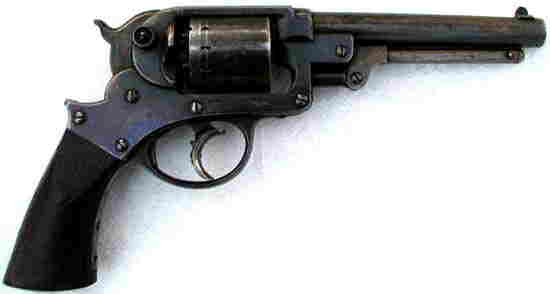
Right Side View of The Model 1858 Double Action .44 Caliber Percussion Army Revolver
|
|
|
|
|
|
As stated in the posting for Part 1 of 3, the double action Starr
revolver has been described as a hybrid between a double and single
action gun. It is actually a "self cocker" as the large front "trigger"
only cocks the hammer and rotates the cylinder. There is an adjustable
curved spring lug, screw-held to the rear of the cocking lever that
engages the small "real" trigger at the inside rear of the guard
that actually releases the hammer to strike the percussion cap to
fire the gun. When properly adjusted a long smooth pull of the front
trigger or cocking lever will push into and activate the small real
trigger behind it. The rear trigger can be seen in the following
photograph. It can also be activated separately after the revolver
is cocked.
|
|
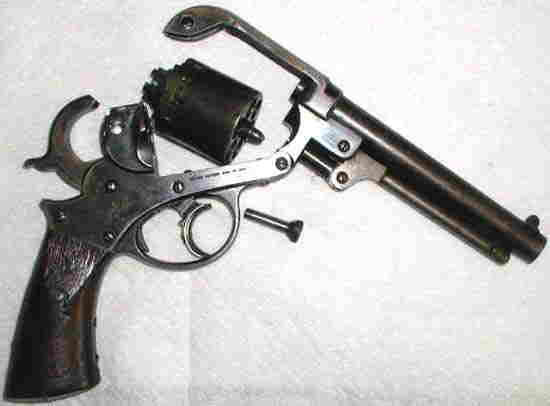
Right Side View of The Starr Army, Cocked with Frame Open - Hinge Screw and Cylinder Removed
|
|
|
The blued hinged barrel is 6 inches long and marked with a small
"C" on the right side towards the rear of the barrel and a small
"F" on the barrel's left rear side. It is rifled with 6 grooves.
The mortised iron front sight base is ¼" from the muzzle.
The "V" notch in the hammer lip serves as the rear sight. The loading
lever is cased hardened and is secured by a spring actuated plunger.
The rounded lever catch is 7/16" from the muzzle. The two-piece
blued frame is held together by a round knurled thumb screw which
enters from the right side behind the recoil shield and hammer.
The frame is stamped on the outside beneath the cylinder with the
address on the left frame and the patent date on the right frame.
This is opposite of the stampings on the Navy Model. The Army frame
is also stamped with a small "C" above and below the front frame
hinge screw on the left side. Another small "C" is stamped to the
rear of the front trigger guard screw.
|
|
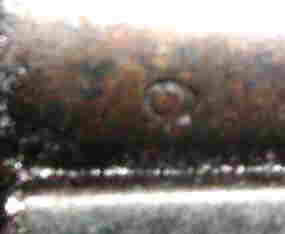
"C" On Right Rear Barrel
|
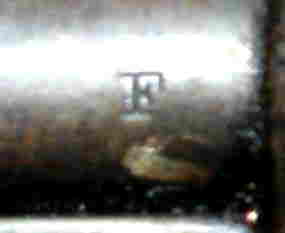
"F" On Left Rear Barrel
|

Left
Frame Marking
|
|
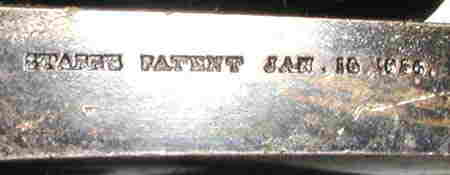
Right
Frame Marking
|
|
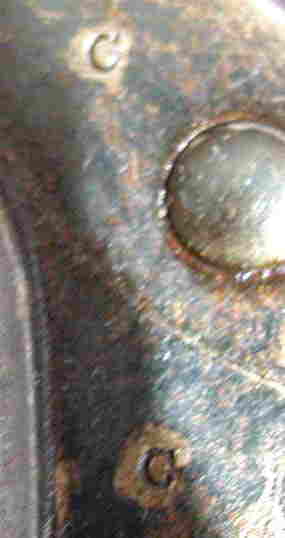
"C" Stampings, Left Rear Frame
|
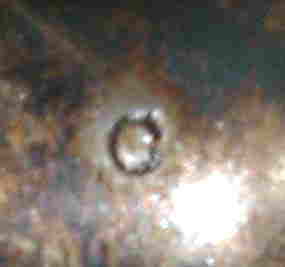
"C" Stamp, Rear Of Front Trigger Screw
|
|
|
|
|
The heavily beveled large semi-circular loading groove above the
hinge screw at the lower front of the rounded frame differs in shape
from the Navy Model as does the right-angle contour of the frame
itself. The shape of the recoil shield is also different having
a larger capping cutout at the lower edge on the right side of the
revolver. The separate, blued backstrap is held to the frame by
the rearmost frame screw, while the front strap is integral with
the large oval trigger guard. The very short hammer spur is case-hardened.
The one-piece walnut grips are oil-finished. The grip is rounded
at the bottom and is without a butt strap. The weapon measures 12-5/8"
overall and weighs 2 pounds, 14 ounces. The partially exposed nipples
are parallel to the axis of the chambers.
|
|
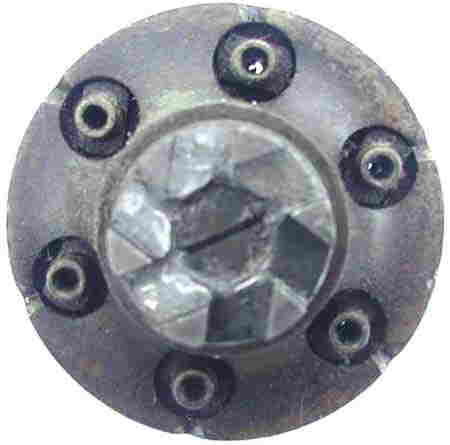
Rear View Of Cylinder
|
|
|
|
|
|
The 1-7/8" inch, six-shot, .44 caliber blued cylinder is marked
with a serial number and two small "C"s. The oval stop slots are
supplemented by intermediate safety slots of the same size.
|
|

Close Up of Cylinder Serial Number "13918" And Oval Cylinder Stop |

"C" Stampings on Cylinder |
|
|
|
|
The serial number will also be seen at the front bottom of the frame,
on the inside rear of the hammer shank, and on the hammer rest.
Additionally, it is stamped on the bottom of the barrel at the forward
most frame screw. The latter stamping is difficult to see and has
not been photographed. Normally, only the first digit or two can
be seen without taking the arm apart.
|
|

Serial Number "13918" at Front Bottom of Frame
|
|
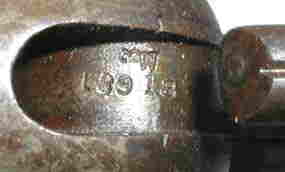
Serial
Number "13918" Stamped on Hammer Rest
|
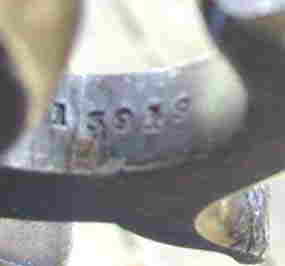
Serial Number "13918" on Hammer Shank
|
|
|
|
|
The Starr Army Model is seldom found without inspector markings.
In addition to the numerous small inspector markings both grips
have inspector's cartouches. The inspector's initials on both grips
of this arm are "GKC".
|
|
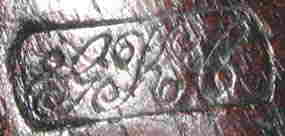
"GKC", On Left Grip
|
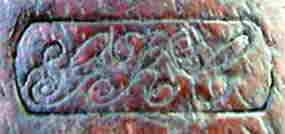
"GKC", On Right Grip
|
|
|
|
|
The next posting, "3 STARS FOR STARR - PART 3 ", will feature the
the Starr Model 1863 Single Action .44 Caliber Percussion Army Revolver.
|
|
|
A substantial amount of reference material and wording for this
posting came from Robert M. Reilly and his book "U.S. SMALL ARMS
1816 - 1865". William B. Edwards' book , "CIVIL WAR GUNS" was also
utilized and Norm Flayderman's FLAYDERMAN'S GUIDE(S) TO ANTIQUE
AMERICAN FIREARMS.... AND THEIR VALUES." Information was also reviewed
from an American Rifleman reprint by the NRA - "CIVIL WAR SMALL
ARMS".
|
|
|
Again, my son and webmaster, Reed Radcliffe, processed this data
to my (our) web page.
|
|
| Dave
Radcliffe
|
|